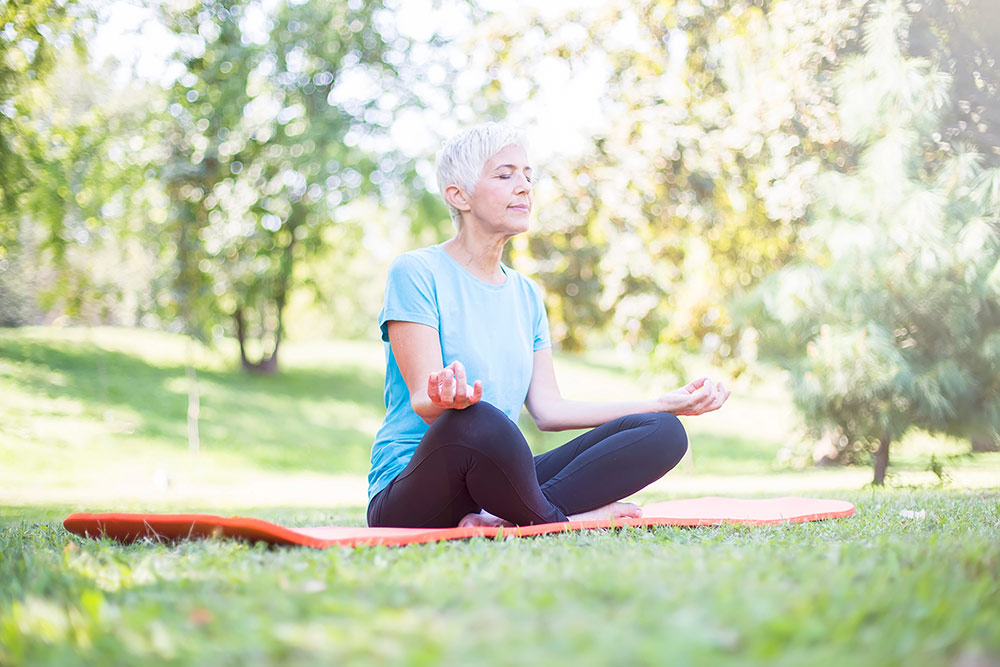Meditation has been relieving and treating many diseases since ancient times. It is known to alleviate chronic pain and help prevent certain illnesses like hypertension, heart disease, and cancer.
Even now, with massive innovations in medical technology, studies proved that meditation is still a relevant holistic activity, especially if you have a chronic condition like Alzheimer’s disease.
Alzheimer’s disease is a progressive brain condition that damages a person’s memory, thinking, and behavior. Over time, a person with Alzheimer’s will find it challenging to carry out the simplest of tasks, experience intense memory loss, and develop unpredictable behaviors.
If you are a caregiver in a dementia assisted living community, or a loved one of a senior with Alzheimer’s, then you know how important it is for them to have a calm and relaxed mind. One way to achieve this is through practicing meditation.
Below is a rundown of what meditation is and how it can help your loved one’s battle against Alzheimer’s disease.
What Is Meditation?
Meditation refers to a technique used to develop increased awareness, attention, and focus to achieve a mentally and emotionally stable state.
It trains an individual to process his/her thoughts, feelings, and emotions without judgment; just processing it to understand and get a healthy perspective.
Meditation has many types and styles to cater to a person’s needs and preferences. This includes:
- Mindfulness meditation
- Spiritual meditation
- Movement meditation like yoga and qigong
- Focused meditation, such as listening to a gong or counting mala beads.
- Progressive or body-scan relaxation
- Visualization meditation
Some of these meditation techniques are even practiced by seniors in dementia assisted living facilities as part of their supportive therapy program. One of the most famous meditation styles of choice is movement meditation, specifically yoga.
Yoga is an exercise routine that strengthens a lot more than the physical body. It is a holistic workout that influences both the body and mind.
Yoga is an inclusive exercise perfect for people of all ages, sizes, fitness levels, and health conditions. More importantly, it’s a safe and effective routine that can positively impact the life of your senior loved one with dementia.
Here are just some of the benefits seniors can gain by practicing yoga and meditation.
1. Yoga Keeps the Physical Body Healthy
When seniors with Alzheimer’s disease try to engage in exercise activities, most loved ones fear that they might overexert themselves and get pushed to their limits. The tough positions and unattainable-looking twists that mainstream media depicts of yoga certainly do not help the situation.
However, you should remember that yoga has a person-centered approach. This means that it can be tailored to meet your loved one’s health needs, one of which is to strengthen their physical body.
Elderlies with dementia don’t usually have the enthusiasm to do taxing physical activities. But yoga is different since it focuses on relaxing the mind while doing routines that benefit the body in many ways. This includes:
- Improving flexibility, balance, and mobility.
- Strengthens the bones and muscles of the body.
- Enhances the blood flow throughout the body.
- Improves oxygen and nutrient distribution.
- Boosts metabolism
Other yoga techniques can also help burn excess calories and restore your loved one’s appropriate weight.
2. Meditation Slows the Progression of Dementia
Dementia assisted living facilities aim to improve a senior’s quality of life by doing therapies that help slow down the disease’s progression. One way to do that is through meditation and yoga.
Many studies have proven the effectiveness of meditation on brain health. For one, the steps included in yoga (e.g., posture, visualization, and concentration) stimulate brain activity. Thus, keeping the brain cells active and urging them to build new connections with each other.
Further, yoga and meditation also act as cognitive training to improve the functions of the brain, such as:
- Memory, concentration, thinking skills, and learning.
- Motor and tactile skills.
- Focus and attention.
As a result of these benefits, seniors can better their prognosis, manage symptoms, and slow down their disease progression. Not to mention slowing down the rate of their brain’s aging process.

3. Meditation Improves Mental Health
Besides its actual contribution to the brain’s health, meditation also keeps a senior’s mental and psychological well-being in good shape. Also, this is an excellent way to ward off the agitation, anxiousness, and aggressiveness that comes with Alzheimer’s disease.
Stress is also a significant trigger for most seniors with Alzheimer’s. In fact, stress immensely contributes to the progression of dementia to Alzheimer’s disease.
A stressful environment, activity, or situation can set seniors off and cause them to throw tantrums and exhibit problematic behaviors.
To lessen these instances, dementia assisted living communities encourage meditation to help residents achieve a calm state. Meditation clears away the confusion and stress that builds up in your loved one’s mind every day, causing them to burst at certain moments.
Moreover, it helps seniors find peace and balance, helping them manage their behavioral symptoms and emotional outbursts.
Meditation is also a great tool to relieve feelings of isolation and loneliness in seniors with dementia. Also, it prevents these negative feelings from turning into a full-blown mental health illness like depression and anxiety disorder.
4. Yoga Protects Seniors from Other Illnesses
By protecting your loved one from stress, yoga helps stave off other chronic medical conditions that may be worsened by stress. Further, some studies had been made to prove that yoga can help a person manage the symptoms of certain diseases, such as:
- Anxiety disorder and panic attacks
- Asthma
- Cancer
- Irritable bowel syndrome
- Cardiovascular problems
- Sleep problems
- Depression
- Chronic pain
- Tension headaches.
It also prevents dementia from progressing to a much worse illness like Alzheimer’s disease or mixed dementia.
Above all, meditation and yoga also reduce unwanted inflammation, helping seniors who are also battling autoimmune diseases.
5. Meditation Improves Your Outlook on Life
Ultimately, with all the benefits mentioned above, yoga and meditation help seniors with Alzheimer’s develop a positive outlook on life. It promotes emotional health, better self-image and generates positive feelings, all of which leads to a better quality of life.



